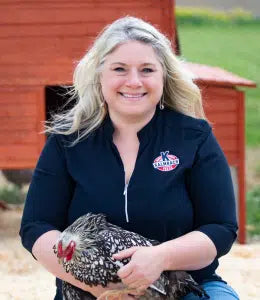Rooster Nutrition 101: What to Feed Roosters

While hens often get all the attention in backyard chicken keeping because of their egg-laying abilities, let's not forget about your flock's resident gentleman. Whether you planned to add a rooster to your flock or he was a surprise addition (those pullets sometimes have other ideas!), understanding how to feed your rooster correctly is essential for his health and longevity.
Let's explore the nutritional needs of roosters and how you can ensure your feathered fellas are getting precisely what they need to thrive.
Do Roosters Need Different Feed Compared to Hens?
The short answer is yes – roosters have different nutritional requirements than laying hens, primarily due to one key nutrient: calcium.
Laying hens need significant amounts of calcium (3-5% of their total diet) to produce strong eggshells day after day. Roosters only require about 1% calcium in their diet to maintain healthy bones and essential bodily functions.
When roosters consume the high-calcium feeds designed for laying hens over extended periods, they can develop health issues. Their kidneys must process excess calcium, potentially leading to kidney strain or even visceral gout, where uric acid crystals accumulate in organs over time.
Think of it this way: feeding a rooster layer feed is like giving people calcium supplements when they don't need them. Their bodies must work overtime to process and eliminate what they can't use!
While it's convenient to feed your entire flock the same food, adjusting your feed strategy is worth considering to ensure your rooster stays healthy in the long run.
What Do Roosters Eat?
Maintenance or Grower Feed
One of the best options for roosters is a maintenance feed or grower feed, which typically contains appropriate protein levels (15-16%) and lower calcium levels (around 1%) than layer feeds. Our Flock Maintainer™ feed provides balanced nutrition that meets a rooster's needs without the excess calcium.
Mixed Flock Solutions
If separating your rooster's feed from your hens isn't practical, consider our Henhouse Reserve® feed. This specially formulated feed contains multiple independent sources of calcium, allowing hens to get what they need while roosters can naturally regulate their calcium intake.
Rooster-Specific Feed Options
Our Formula of Champions® Fancy & Feathered® feed is specifically formulated for specialized breeding flocks to provide optimal nutrition for both hens and roosters. It contains balanced calcium levels that support egg production without harming roosters.
Supplemental Foods and Treats
Roosters enjoy many of the same healthy treats as hens. Scratch grains, dried mealworms, fresh vegetables, and fruits make excellent supplements to their regular diet. These treats provide nutritional variety and enrichment activities for foraging roosters.
Fresh, Clean Water
Like all poultry, roosters need constant access to fresh, clean water. A rooster may consume more water in hot weather, so check waterers frequently, especially during summer.
How to Feed Roosters for Fertility
If your rooster is part of a breeding program, his nutritional needs take on even greater importance. What he eats directly impacts his fertility and the viability of your hatching eggs.
Provide Adequate Protein
Roosters require sufficient protein (15-17%) to maintain healthy sperm production. Inadequate protein can reduce both the quantity and quality of semen, directly affecting fertilization rates.
Include Essential Fatty Acids
Rooster semen contains a high amount of polyunsaturated fatty acids (PUFAs) that protect sperm cells. Feeds containing omega-3 and omega-6 fatty acids support optimal sperm health and viability.
Provide Roosters with Antioxidant Supplements
Oxidative stress is the enemy of sperm health. Vitamin E and selenium are powerful antioxidants that help protect sperm cells from damage. Our feeds containing LifeGuard® provide additional antioxidant support through a proprietary blend of prebiotics, probiotics, essential oils, and enzymes.
Ensuring Proper Hydration for Roosters
Dehydration can rapidly affect a rooster's fertility. Ensuring continuous access to clean water is essential for maintaining proper semen volume and quality.
What Food Should You Avoid Feeding Roosters?
High-Calcium Layer Feeds
Feeds with calcium levels above 3% can harm roosters if used exclusively for extended periods. If you must use layer feed for your mixed flock, offer separate feeding opportunities for your rooster with a lower-calcium option.
Avoid Excessive Treats
While treats are great in moderation, too many can unbalance a rooster's diet. Limit treats to no more than 10% of your rooster's daily diet to ensure he's getting complete nutrition from his main feed.
Harmful Foods
Some foods are dangerous for all poultry, including roosters. Avoid feeding:
- Chocolate or candy
- Avocado pits and skins
- Raw potato peels
- Moldy or spoiled foods
- Onions in large amounts
- Salty foods
How Much and How Often Should You Feed Roosters?
The average adult rooster consumes about 5-7 ounces (approximately 1/2 to 2/3 cup) of feed daily, but this amount varies depending on the bird's size, activity level, and environmental conditions.
Most backyard flockkeepers find success with one of two feeding approaches:
Free-Choice Feeding:
Providing constant access to feed throughout the day works well for most flocks. Roosters tend to self-regulate their intake and will eat what they need.
Scheduled Feedings:
Some keepers prefer to feed their flocks twice daily – morning and evening. This method allows for better monitoring of feed consumption and can reduce waste.
In either case, always ensure your rooster can access fresh, clean water.
Explore Rooster Feed Options from Kalmbach Feeds
At Kalmbach Feeds, we understand the nutritional needs of your entire flock, including your roosters. Our feed options provide solutions for flocks of all types. All our feeds include our exclusive LifeGuard® blend of prebiotics, probiotics, essential oils, and enzymes to support digestive and immune health – keeping your roosters in peak condition year-round.
Visit your local Kalmbach Feeds dealer today for the perfect nutritional solution for your flock's handsome protector. Because while it's not all about the hens, proper rooster nutrition ensures your entire flock remains healthy, happy, and productive!
